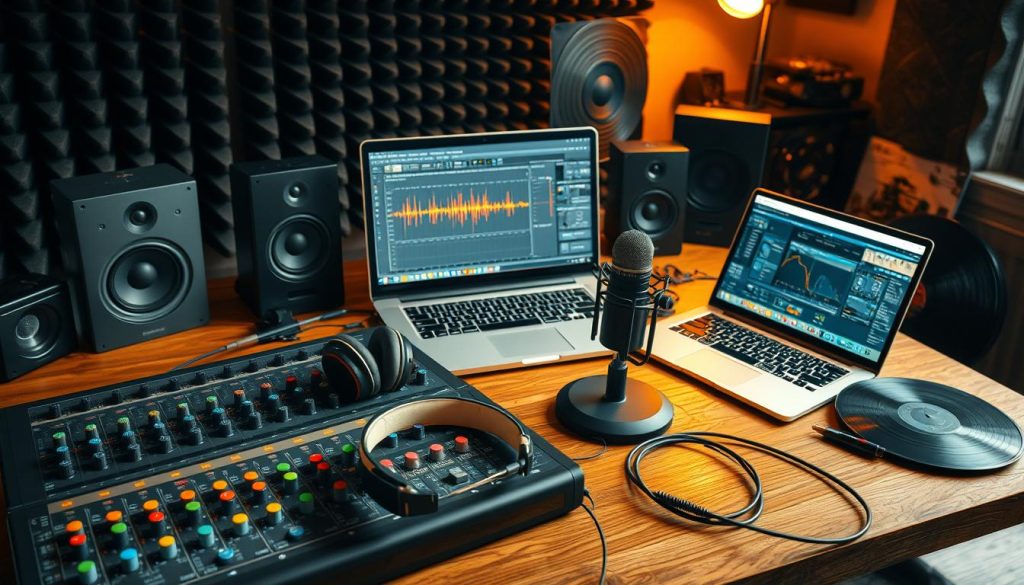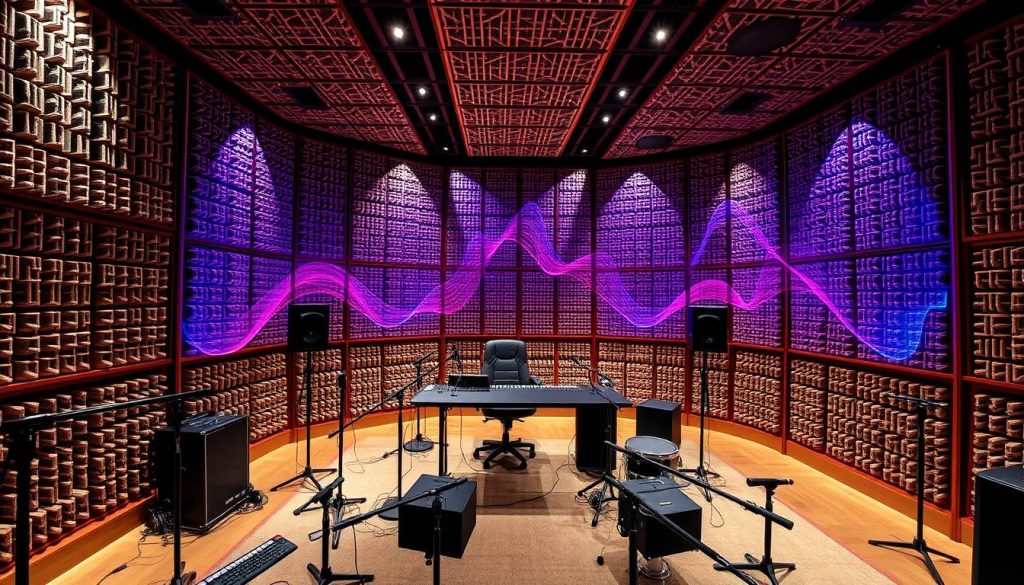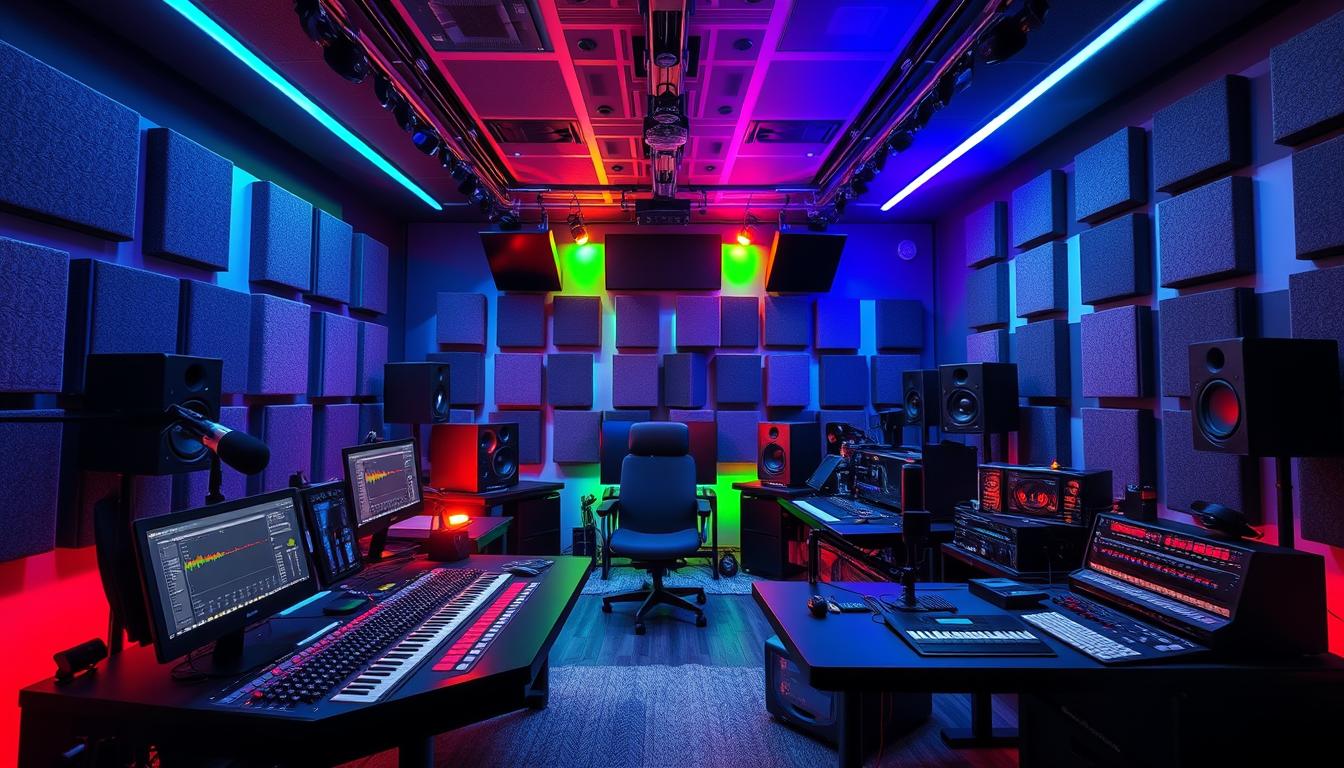I’ve always been drawn to studio sound engineering. It’s amazing how you can take sound and make it sound professional. If you like music, live shows, or movies, this field has many exciting jobs.
Studio sound engineering is not just about tech skills. It’s also about art. Every little thing you do, like where you place a microphone, affects the sound. This makes the final product sound great.
Getting into this world shows how precise and detailed it is. You need to know about acoustics and listen carefully. It’s hard but very rewarding to become a good sound engineer.
If you want to work in a recording studio, a live venue, or in movies, this is your chance. Studio sound engineering is full of possibilities for those who work hard. I’m excited to see what I can learn and do in this field.
The Fascinating World of Sound Engineering
Sound engineering is a field that mixes technical skills, artistic feel, and a love for audio. If you want to be a sound engineer, you’re starting a journey. You’ll learn about sound waves, how to work with audio gear, and digital tools. This field is full of chances to show off your skills.
Understanding Sound Engineering
Sound engineering is all about knowing how sound moves and reacts in different places. You’ll study acoustics to learn how to place mics, set up studios, and make venues sound great. This knowledge helps you work with audio clearly and precisely.
Essential Skills for Aspiring Sound Engineers
- Proficiency with audio equipment, including microphones, mixers, and digital audio workstations (DAWs)
- Keen attention to detail and problem-solving skills to troubleshoot and optimize audio setups
- Creativity and a keen musical ear to shape and enhance the artistic expression of audio
- Strong communication and collaboration skills to work effectively with artists, producers, and other professionals
- Continuous learning and adaptability to stay current with the latest sound engineering techniques and technologies
With these skills, you’ll become a skilled sound engineer. You’ll be able to make amazing audio for many places, like studios and live shows.
Embarking on a Sound Engineering Career
Sound engineers have many ways to start their careers. Getting a degree or diploma in sound engineering helps a lot. It gives you the knowledge and skills you need.
Universities and colleges offer programs in audio engineering, music production, or sound design. These programs teach you the technical skills and give you hands-on experience.
Education and Training Pathways
Enrolling in a sound engineering program is a good choice. You’ll learn about acoustic principles, digital audio workstations, and more. You’ll also get to practice through recording sessions and live events.
Or, you can look for internships or assistant jobs in studios or venues. These jobs let you learn from pros and build your portfolio. Meeting other sound engineers and music pros can also help you find work and projects.
| Education and Training Options | Advantages |
|---|---|
| Sound Engineering Degree/Diploma Programs | Comprehensive curriculum, hands-on experience, technical expertise |
| Internships and Assistant Roles | Practical learning, industry connections, portfolio building |
| Networking with Sound Engineering Professionals | Collaborative opportunities, job prospects, industry insights |
Whether you go for formal education or hands-on experience, success in sound engineering needs technical skills, creativity, and a love for audio. With the right training and hard work, you can start an exciting career in sound engineering.
studio sound engineering: A Dynamic Field
The world of studio sound engineering is full of different jobs. You can work on music, film, or TV soundtracks. Sound engineers make the sounds that grab our attention and move us.
If you like the details of making music or the thrill of live shows, this field is for you. Engineers work on music albums, making sure the sounds fit together perfectly. They also work on movies, making sure every sound is just right.
Sound engineers also work at live events, making sure the music sounds great everywhere in the venue. They set up and manage the equipment for concerts and big events. These professionals make sure everyone in the audience can hear the music clearly and feel like they’re part of the show.
The job of studio sound engineering is always changing with new technology. It’s a great career for those who love music and want to keep learning. Whether you want to work in sound engineering, music production, or audio post-production, there are many options.
| Career Pathways in Studio Sound Engineering | Key Skills Required |
|---|---|
| Live Sound Engineering |
|
| Studio Recording |
|
| Audio Post-Production |
|
Studio sound engineering lets you learn many skills, from live shows to making music and editing for movies. By keeping up with new trends and tech, sound engineers can have exciting and fulfilling careers.
Building Your Professional Portfolio

As an aspiring sound engineer, it’s key to build a strong portfolio. This shows off your skills and helps you get into the industry. Include your best work, like recordings you’ve done or projects you’ve worked on. Show how you helped with each project to prove your skills.
Showcasing Your Audio Engineering Expertise
A good sound engineering portfolio can really boost your career. Here are some tips to make yours stand out:
- Pick your best sound engineering portfolio work to show off.
- Add different audio production samples, like music, sound design, and post-production work.
- Explain your role and what you did in each music recording demos or audio post-production projects.
- Make sure your portfolio looks good, is easy to find things in, and is fun to look at.
- Think about adding reviews or references from people you’ve worked with to prove you’re good.
With a strong and eye-catching sound engineering portfolio, you can show off your skills well. This will help you get more chances to work in the exciting world of sound engineering.
Mastering Acoustic Principles for Exceptional Audio Quality

As a sound engineer, knowing the basics of acoustics is key for top-notch audio quality. It’s about controlling sound reflections and echoes, and managing reverberations. This knowledge helps make professional-quality audio recordings.
Sound waves are central to acoustics. Engineers need to know how these waves act in different settings. They learn how room size, surface textures, and equipment placement affect sound.
Understanding sound reflections and reverberations lets engineers shape the audio environment. They use sound-absorbing materials, place mics just right, and use digital tools to fine-tune the sound.
Knowing acoustics helps engineers handle different recording spots. Whether it’s a small studio or a big concert hall, they can adjust the sound to get great quality audio.
Mastering acoustics is crucial for sound engineering. It lets engineers control sound waves for amazing audio that grabs listeners and improves their experience.
Networking in the Sound Engineering Industry
Being good at sound engineering is not just about knowing the tech. It’s also about making strong connections and building a network. If you want to get ahead in this field, joining the industry’s community is key. It can lead to new jobs, projects, and great advice.
Leveraging Industry Events
Going to events like audio engineering conferences and music festivals is a great way to meet people and learn new things. These events bring together sound engineers, producers, and musicians. It’s a chance to share ideas, show your work, and find new partners or jobs.
Joining Professional Associations
Joining groups like the Audio Engineering Society (AES) or the National Association of Music Merchants (NAMM) can really help your career. These groups offer lots of resources, like training, mentorship, and job listings. Being active in their events and online groups helps you meet experienced people and keep up with the latest in the industry.
Fostering Audio Engineer Collaborations
Working with other audio pros is key in this field. Look for chances to work together on projects, like recording, live shows, or editing. These projects improve your skills and let you show off your work. They also help you make lasting connections and find new jobs through recommendations.
Networking is powerful for sound engineers. It opens up more career chances, keeps you updated on trends, and helps you make important connections. The sound engineering world grows by sharing ideas and forming strong partnerships.
Continuous Learning: Staying Ahead in a Rapidly Evolving Field
As a sound engineer, I see our field always changing. New tech and methods come out often. To keep up, I must keep learning. I go to workshops, conferences, and take online courses to get better at my job.
These courses help me learn new things and keep up with trends. They teach me about the latest audio software and recording methods. This way, I can do my job better and stay ahead.
It’s also important to follow industry news and tech updates. I read industry magazines, follow sound engineers on social media, and join online talks. This helps me know about new things and best practices. By doing this, I can give my clients the best audio quality and new solutions.

